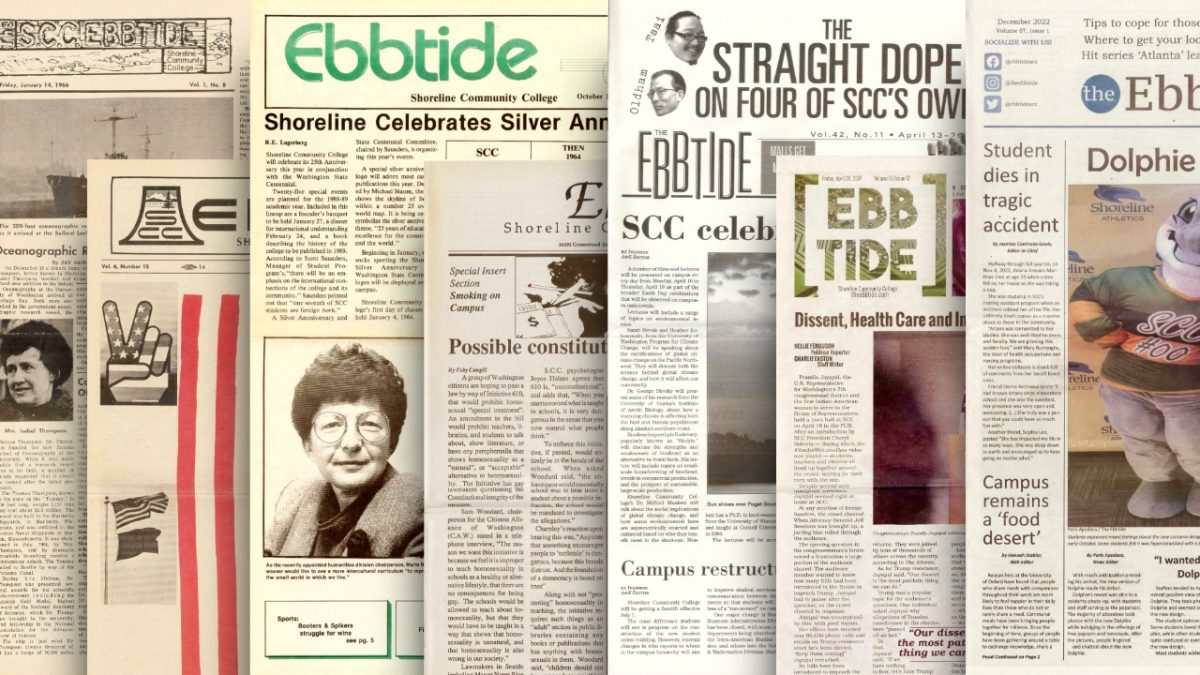WHERE TEXTBOOKS FALL SHORT
With a new quarter in full swing, an old problem may be facing students — and it comes in the form of a textbook.
The pattern is familiar: Instructors will list required reading in the syllabus, and it will be purchased only to be returned later on. As a result, textbooks end up feeling more like extra baggage than must-have study materials.
So, why do they continue to be assigned despite not necessarily being needed?
What’s the Use?
Skyler Trigg, who is currently earning a transfer degree in physical therapy at SCC, has experienced the phenomenon.
At the beginning of Trigg’s Biology 211 course, he says that his class was assigned textbooks to read throughout the quarter — but they never ended up using them. Instead, most of the same information was used by his professor in presentations.
“Luckily, I never had to purchase it,” he says, expressing his gratitude for SCC’s bookstore which allowed him to rent it. However, some of his peers weren’t as fortunate, having instead opted to buy the book for approximately $100.
“They were a little frustrated with never having to actually use it throughout the quarter,” he says.
Trigg wishes that professors were more transparent about the relevance of textbooks to their respective courses, speculating that around 80 percent of college classes that he’s taken assign some form of a textbook, while he’s only needed one in around half of them.
Trigg has even passed certain courses without obtaining the recommended text at all.
“Personally, I feel like professors need to be a little bit more upfront with what exactly they’ll be using the textbook for,” says Trigg, “and be a little bit more clear and upfront on whether or not the textbook will actually get used.”
A Price to Pay
Inflation has gone up quite a bit in the past 50 years. In 2017, textbookspyder.com, a search engine dedicated to looking up textbook prices, reported that the price of college textbooks had increased by 1,216 percent since 1977.
This figure is alarming when, for some, the majority of these books aren’t even getting read.
Kunthea Soeung, a business administration student at SCC, is taking a hybrid class — meaning her course meets in person while certain material, including her textbook, is accessed online.
“It’s 1,000 pages. Nobody’s going to read the whole thing, right?” Soeung says of her textbook, explaining that when her professor assigns work from it, only a small fraction is actually needed to answer the questions. “You only read a few sentences that are related to the course.”
Soeung’s online textbook cost her around $100 and is only available for three months. “It’s so expensive,” she says, adding that she plans to return it at the end of the quarter.
Emma Ward, who is studying oceanography and English at SCC, has encountered the same situation, stating that sometimes the information in a textbook will be used on a test but never in an actual assignment. “You can basically look up that information anywhere else, too,” she says.
Beyond the Book
The dilemma isn’t limited to textbooks that merely go unused.
Access codes present another obstacle, forcing students to buy entire books for a single code on the inside which only then grants them access to supplementary lessons online. As a result, the physical book — paid for in full — remains untouched for the duration of the course.
A 2018 report released by the U.S. Public Interest Research Group revealed that publishers are able to sell at large values by including these codes in their textbooks.
“Many professors using publisher materials require students to purchase more restrictive and costly products such as access codes,” it reads, “which hide homework and quizzes behind an online paywall.”
Which raises the question: Why the extra baggage? And why the hassle?
For those tasked with buying textbooks this quarter, here are three steps you can take to avoid the nagging feeling of money being wasted:
1. Assess the Situation
At the beginning of the course, speak with your professor to determine exactly what the assigned reading will be used for.
If the textbook is required, you can determine alternative ways to find the information early on. If you learn that the book will be used infrequently, or assigned solely for an access code instead of its actual contents, politely explain why you would rather not make the entire purchase.
2. Rent It
If worse comes to worst and you must acquire the book, the SCC bookstore and websites like Amazon will allow you to rent it — a solution which may prove more bearable than dropping a large sum of money all at once.
3. Return It
Fortunately, the first and last few days of every quarter at SCC bring an opportunity for students to sell any textbooks they have purchased, new or used, at a window down the hall from the PUB’s bookstore.
Have you ever been assigned a textbook that was never used? Write to the reporter at [email protected] to share your experience.








